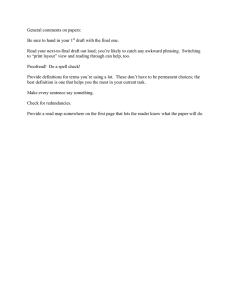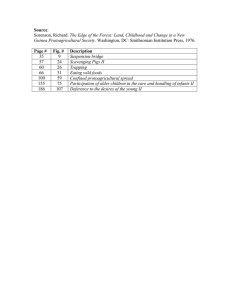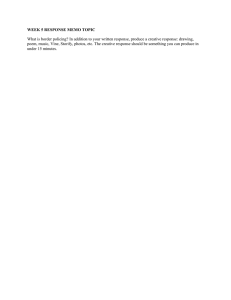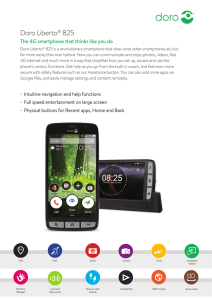21A.460 May 10, 2005 Guidelines about paper
advertisement
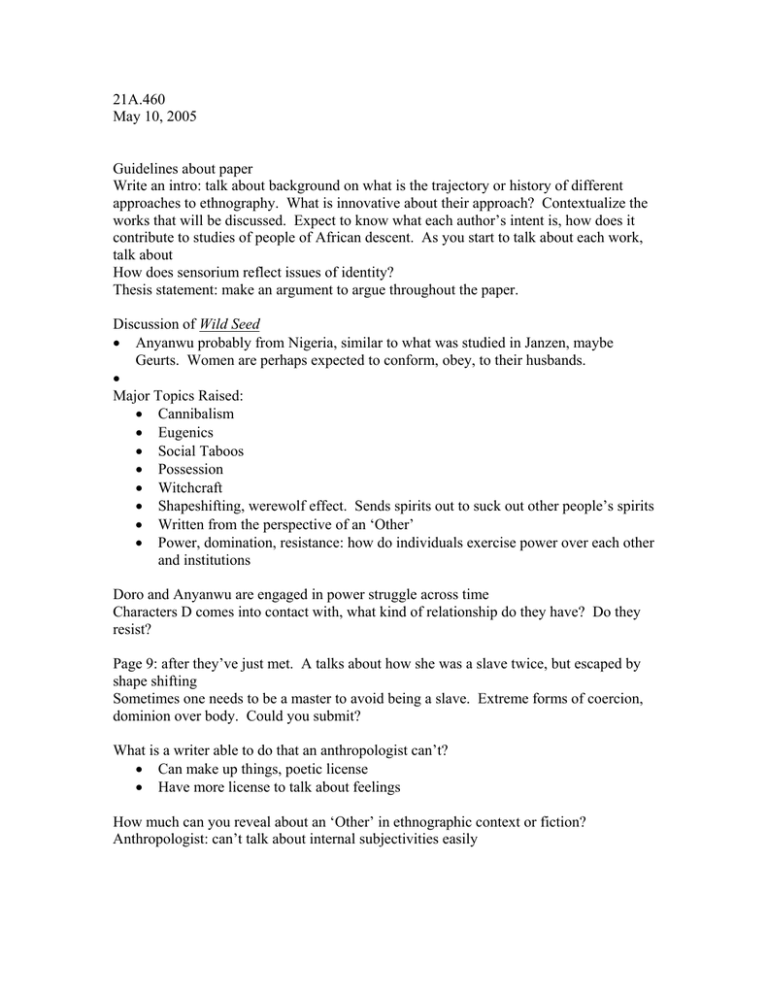
21A.460 May 10, 2005 Guidelines about paper Write an intro: talk about background on what is the trajectory or history of different approaches to ethnography. What is innovative about their approach? Contextualize the works that will be discussed. Expect to know what each author’s intent is, how does it contribute to studies of people of African descent. As you start to talk about each work, talk about How does sensorium reflect issues of identity? Thesis statement: make an argument to argue throughout the paper. Discussion of Wild Seed • Anyanwu probably from Nigeria, similar to what was studied in Janzen, maybe Geurts. Women are perhaps expected to conform, obey, to their husbands. • Major Topics Raised: • Cannibalism • Eugenics • Social Taboos • Possession • Witchcraft • Shapeshifting, werewolf effect. Sends spirits out to suck out other people’s spirits • Written from the perspective of an ‘Other’ • Power, domination, resistance: how do individuals exercise power over each other and institutions Doro and Anyanwu are engaged in power struggle across time Characters D comes into contact with, what kind of relationship do they have? Do they resist? Page 9: after they’ve just met. A talks about how she was a slave twice, but escaped by shape shifting Sometimes one needs to be a master to avoid being a slave. Extreme forms of coercion, dominion over body. Could you submit? What is a writer able to do that an anthropologist can’t? • Can make up things, poetic license • Have more license to talk about feelings How much can you reveal about an ‘Other’ in ethnographic context or fiction? Anthropologist: can’t talk about internal subjectivities easily She seemed to submit to him relatively easily. At what point did she have a physical demonstration of his powers? Calls himself a cannibal, possesses bodies until they are useless to him Aspect of person out that suck vitality, life force out of person. Could be called a vampire, although taking over entire body. Same kind of supernatural entity. What is the message behind presenting a character that can shift? Suggests flexibility of identity Raises questions of race? Who are Doro’s children? What constitutes relatedness? How is kinship described? They both talk about who ‘their’ people are – are they related by blood, for example. What’s his main purpose in doing what he’s doing? What’s his goal? Building a superior clan/family with superpowers Think about breeding on plantations? Slaves were bred. In countries with slaves there was strategic breeding of certain individuals with others to generate certain characteristics. How is it that people who are dominated become the dominators? Trying to breed people who are as long-lived as he so he won’t be lonely. What do you think of her as a healer? Took particular role as a healer in the village How to people know others? Observation, sight, taste, bite. Doro touches their spirit to know who they are. Senses people who are different, drawn to them. Suggestion that there are different ways of knowing than just sight. Another thing that’s interesting Page 18: Doro talking about how it is that he can just take people away from their families. Those who are different and outcast may be more sensitive, have something of value that is not apparent on the surface. Mental illness can take on another meaning. Mental illness can be spiritual, if not cultivated, can be dangerous. What is the meaning of certain kinds of illness? Intra and inter group politics: what is it that causes conflict? Page 52: Mental illness can indicate transformation between one state and another. How it is up to the individual to change their environment to the extent that they are capable. Not able to stop slave trade, but to control it. Hard to overturn whole system, easier to work with it Affliction is seen as from an outside source. Doro’s son. Isaac. Telekinesis. Interesting thing about him was that he was mentally stable MIT OpenCourseWare http://ocw.mit.edu 21A.460J / WGS.620J Medicine, Religion and Politics in Africa and the African Diaspora Spring 2005 For information about citing these materials or our Terms of Use, visit: http://ocw.mit.edu/terms.
